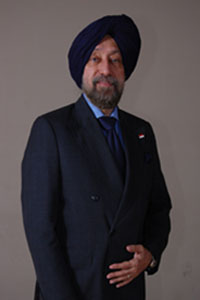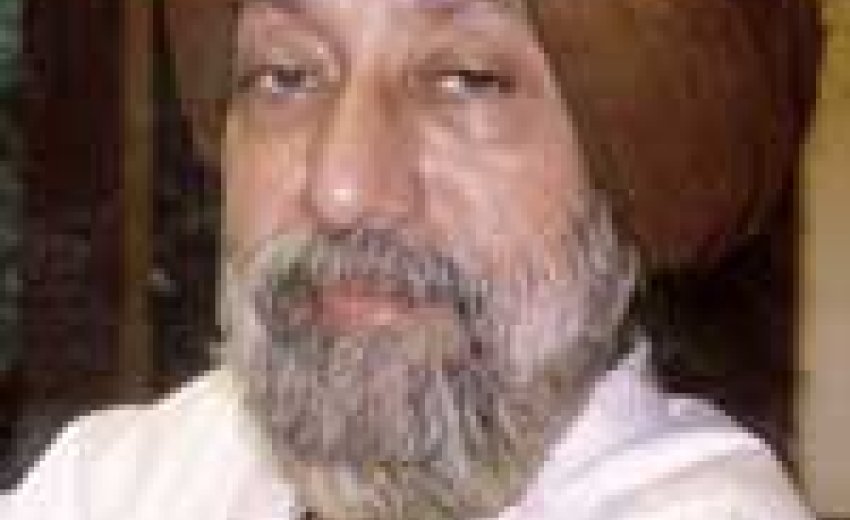 In a country rife with corruption it takes a person of immense courage to fight for justice without once giving in.
In a country rife with corruption it takes a person of immense courage to fight for justice without once giving in.
Dr. Harbrinderjit Singh Dillon is one such person.
As Dillon sits at his desk and readies for the interview, he remarks, "This is the year of the Rooster -- this is my year!"
Like the traits associated with his birth sign, there is an element of vibrancy about him. His first words of welcome in Bahasa Indonesia put in perspective who he really is: Dillon has the face of a debonair Indian Sikh, but his soul belongs firmly in Indonesia.
Dillon has been at the forefront of political activism for more than two decades. He is a voice for the peasants, a champion of human rights. He has also been a figure of terror, primarily for the corrupt. His words spare no one.
He is solid figure but his observations are cutting. Like a knife chiseling wood, he fashions the story of his life, nicking some along the way, carving out hope for others.
"My great grandfather was a farmer in Punjab, India, who migrated to Medan decades back. Plantation runners were much in demand by the Dutch in Indonesia then. But unlike in Malaysia, where the bulk of plantation workers were Indians deported by the British, here they were mostly locals," Dillon says.
One wonders if the Indian Sikh family, with their traditional costumes and turbans, were readily accepted in North Sumatra. Dillon turns wistful."In my entire career, I have been discriminated against because of my turban just once, when I was told that I could never make a minister, coming from a minority.
"Indonesians are very warm people. There is no reason for them to discriminate against Indians. Sikhs have been part of the Indonesian fabric from way back. Even in my great-grandfather's time they were a fairly large community of two to three thousand people employed as mostly farmers."
His great-grandfather joined this workforce and went on to found the Khalsa School for the people of his community.
By the time Dillon entered the world three generations later, Sikhism meant less to him than his forefathers. Instead, he was more interested in being an Indonesian.
Growing up in Medan, Dillon was exposed to the unfortunate lives of the farmers at first hand. It made him understand the importance of a strong agricultural economy.
As he puts it today, "Agriculture and agriculture-based industrialization should be at the center of economic strategy. When you enhance agricultural productivity, you increase incomes".
However, the situation in the 1950s was a far cry from his understanding of today. The plight of farmers was characterized by poverty and negligence.
The gross injustice of their plight struck a chord in Dillon. He wished to speak out against it but he realized at a young age that to be heard one first needed to be armed with the power of knowledge -- and money.
After his basic education in Medan, Dillon went on to Cornell University in the United States, where he was offered a fellowship in agricultural trade and development. He majored in international trade and development and also studied resource management, economics and developmental sociology.
He came back to Indonesia to serve as a researcher in the Ministry of Agriculture, rising to assistant for the minister of agriculture over the years.
For a man with a degree from Cornell, it was an unusual decision to head back to Indonesia. Why did he do it? "Because I am somebody here. There is an impact (I can make)," he says.
He turned down a lucrative job for a lesser paying one to realize his burning ambition -- to help the farmers and make a difference.
But rampant corruption at every level made him, he says, a disillusioned man. Not one to take things lying down, he spoke out against important officials in no uncertain terms. This deed cost him his job in the state bureaucracy.
Dillon opted for consultancy work thereafter and embarked on a variety of challenging posts, including as a commissioner for the National Commission on Human Rights; a member of the Council for the National Economy (DEN) reporting to the president; a member of the Joint Investigation Team (Anticorruption) reporting to the Attorney General.
Today, Dillon sits as the Executive Director of the Partnership for Governance Reform in Indonesia.
Interviewed and selected from over 500 candidates, this position brings him much peace of mind. "This is the job of my dreams. I am paid to do what I like doing best", he said.
Talking of donors, Dillon offers his views about tsunami-stricken Aceh. "A lot of money has been generated for the tsunami from here and abroad. I say don't give money, instead give water purifying plants, pre-paid housing and the like. We are becoming nothing but a clearing house for Aceh." he says.
Dillon goes on, "Aceh is full of injustice. If there is no governance in Aceh, Indonesia is doomed. But I am always optimistic. One must have asah (hope) -- asah untuk bangsa (hope for the country). If we have hope, we can build a new Aceh. The future of a new Indonesia is tied up with the future of a new Aceh."
In Dillon's dictionary nothing is impossible. His statements ring with earnest passion. His outspoken, often critical views have made and broken his career. But he has no regrets. "I am a proud man. I am grateful that I have been confident about speaking out".
How is it living with a man of such immense ideals? His Indonesian Muslim wife of 29 years is a perfect companion to the man she married. With a sharp mind of her own to match his, she breaks in, "My husband is a Rooster, I am a Rabbit. We are six signs apart -- a match that is quite a mismatch. We are at loggerheads everyday. That is why we are together still", she says with a smile.
Dillon explains, "My wife, Droupti, is a doctor, a nutritionist. We are poles apart. It is said in Chinese astrology that in a marriage when two people are this dissimilar, it is bound to last. Once differences are mended, that is the end of the relationship," he says, tongue in cheek.
Dillon is a father of three sons. It is a close-knit family where the relationship thrives less on authority and more on imbibing from each other. But one wonders whether they gravitate towards any one religion, as is the case in most mixed marriages. Dillon's answer is as forward-thinking as his views.
"I haven't raised my children as either Sikhs or Muslims. If we are the bow and they the arrows, we should let them go on ahead as good people," he says.
Dillon is a prolific writer, an ardent speaker, an intent listener and an optimistic believer. Most of all, he finally has the power, expertise and the means to see his vision of a dynamic new Indonesia.
There is only one concern. "The scarcest commodity is time," he says.
He has nothing to fear. After all, the year belongs to him. As for the future, there is always asah. Asah untuk bangsa.
Dr. Harbrinderjit Singh Dillon is an Indonesian politician and one of Indonesia’s greatest anti-graft advocates. More popularly known as H.S. Dillon, he has spent two decades at the forefront of political activism.
Early life
Born on April 23, 1945 in Medan, Dillon observed poverty from a small age. His grandparents hailed from Punjab, India and set up a plantation in Medan. It was during his formative years when Dillon began to see poverty firsthand did he find his political calling. He furthered his studies in the United States, majoring in international trade and development at Cornell University.Career
He decided to return to Indonesia to make a difference and joined the Ministry of Agriculture as a researcher. However, the rampant corruption in Indonesian politics angered him and he spoke out regularly against such practices. His outspoken manner eventually cost him his job, but he has never regretted the choices he made during his time at the ministry.Dillon went on to hold several important posts, including as a commissioner for the National Commission on Human Rights and a member of Indonesia’s Anticorruption Investigation Team.
Today, he is the Executive Director of the Partnership for Governance Reform in Indonesia.
(1993-1996) Vice Chairman, National Committee Indonesian Society of Agricultual Economists
(1991-1992) Member, Consultative Committee, Common Fund for Commodities
(1990-1996) Coordinator, Task Force on Agricultural Policy, Indonesian National Committee for Pacific Economic Cooperation (INPEC)
(1993-1998) Member, Indonesian Delegation to the Uruguay Round NegotiationsEducation: PhD Agricultural Economics, Cornell University, USA
Geographic Regions: APEC, ASEAN, Indonesia Research Areas: agriculture, democracy and democratization, economics, environment, ethnic issues, human rights, political economy, regional economic cooperation, trade and economic relationsLanguages: Indonesian, EnglishEducation: PhD Agricultural Economics, Cornell UniversityConcurrent Positions: Commissioner, National Commission on Human Rights, Country Representative, International Association of Agricultural EconomistsPast Positions: Vice President, Asian Society of Agricultural Economists, Seoul 1996-99, Vice Chairman, National Committee, Indonesia Society of Agricultural Economists, Jakarta 1993-96, Executive Committee Member, Asian Society of Agricultural Economists, Seoul 1993-96, Secretary, Board of Supervisors, PTP Commodities Limitied, New York and Indoham (Hamburg-Indonesische Import-Gessel Schoft M.B.H) 1991-96, Assistant to the Minister of Agriculture, Commodity Trade, and Development 1990-96, Coordinator, Task Force on Agricultural Policy, Indonesian National Committee for Pacific Economic Cooperation (INCPEC) 1990-96, Member, Indonesian Delegation to the Uruguay Round Negotations 1988-93, Head of Secretariat, Permanent Agricultural Industrial Working Commission, Ministry of Agriculture and Ministry of Intrnational Trade 1988-93, Member, Consultative Committee, Common Fund for Commodities, Amsterdam 1991-92, Director, Commodity Analysis Division, Ministry of Agriculture 1985-90, Expert Staff, Special Team for Assisted Projects, Directorate General of Estates 1983-85, Staff, Bureau of Planning, Ministry of Agriculture 1976-83, Secretary, Rural Dynamics Study, Agro-Economic Survey, Ministry of Agriculture 1974-76 Publications: "The Value and Benefits to Producers and Consumers of INRA and the Benefits Likely to Be Derived from INRA 2," with S.R. Tabor, Presented at the 30th IRSG Assembly, Hamburg (September-October 1987), "Contract Agriculture in Indonesia: A Status Report," Presented at the IDRC Workshop on Contract Farming in Asia, Singapore (April 1987), "The Trend of Natural Rubber Production in Indonesia till 1990," Presented at the International Rubber Study Group (IRSG) Meeting, London (June 1986), "The Role of the NES Scheme in the Expansion of the Indonesia Natural Rubber Industry," Presented at the 29th IRSG Assembly, Abidjan (November 1985), "The Development of Rubber Smallholders in North Sumatera," Presented at the Structural Changes and Transfer of Technology in Rubber Industry of Malaysia and Indonesia-Macro and Micro Perspective Workshop, Adelaide (February 1985)
